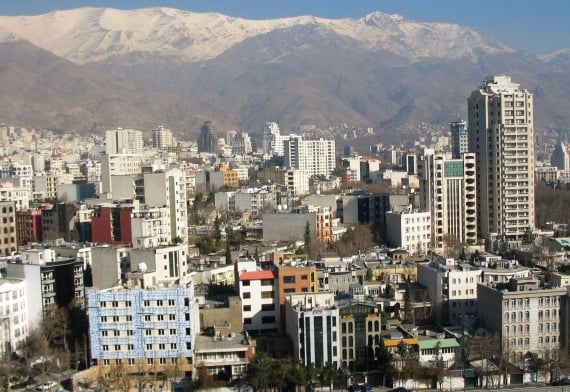Iranians are turning to real estate to protect savings, helping fuel a building boom in the capital, as international sanctions weaken the rial and the government curbs foreign- currency and gold purchases
Mehdi Eslamipour stands amid piles of bricks and abandoned furniture at a Tehran building site where his company just knocked down a three-storey villa to build an apartment block. “Everyone’s looking to build,” he says, pointing to three similar projects on the same street.
Iranians are turning to real estate to protect savings, helping fuel a building boom in the capital, as international sanctions weaken the rial and the government curbs foreign- currency and gold purchases. Eslamipour is planning a nine- storey block of 15 apartments on the 700 square-meter plot (7,500 square feet) of land in northern Tehran. He says it will cost 100 billion rials ($8.1 million.)
Iran’s economy is being squeezed by tougher sanctions imposed this year by the U.S. and European Union, which say they are needed to restrain the Islamic republic’s nuclear program. Iranians stepped up purchases of gold, dollars and euros as hedges against the threat to stability. Those avenues were closed off as authorities banned currency trades outside official venues and made investors wait months to buy gold -- leaving the real estate market as an alternative.
Building permits issued in Tehran jumped 87 percent in the June-August period from a year earlier, statistics from the mayor’s office show. Prices have risen at least 15 percent in the past three months, according to three real estate agents based in the capital. Tehran is more than twice as expensive as Istanbul, a similar-size city in wealthier neighboring Turkey.
Ten Times Richer
“After the fluctuations in the gold and currency markets, the real-estate market has started to move again, and this shows the direction of liquidity,” said Mousa Ghaninejad, an independent Tehran-based economist. “People feel the value of their money is dropping, so they want to switch to something that is a fixed asset.”
The average cost of residential property per square meter in Tehran is about 20 million rials ($1,600) and about 120,000 transactions on average are made every year, according to the Donya-e-Eqtesad newspaper, citing official data. In affluent northern Tehran where Eslamipour is building, prices can rise to about 150 million rials per square meter.
The average city-wide price in Istanbul as of January this year was $771 per square meter, while in Dubai -- whose per- capita income is about 10 times Iran’s -- it was $2,441, according to ReidIn, a real estate company that compiles price indexes and has offices in both cities.
‘Directed to Property’
“When there is devaluation, money is usually directed to property,” said Ramin Rabii, the managing director of Turquoise Partners, a Tehran-based investment firm. He predicts further gains in property prices this year.
The last boom in Tehran house prices was in 2007 and early 2008, when high oil prices spread liquidity through Iran’s economy and banks offered cheap loans, according to Rabii. Prices plunged more than 30 percent from the summer of 2008, when the global economic crisis sparked a slump in oil prices, to mid-2009, according to a July report by the International Monetary Fund that tracked data through the end of 2010.
Iran has a state-owned lender, Bank Maskan, that specializes in housing loans, which account for 28 percent of credit in the banking system, according to the IMF. State home loans are capped at about 180 million rials ($15,000), so Iranians typically use savings and money borrowed from friends and family to pay for homes mostly in cash, Rabii said.
The latest U.S. and European sanctions are targeting Iran’s oil industry and transactions with its central bank. One result was a plunge in the rial’s value early this year, as Iranians concerned about the economy’s stability rushed to protect their savings by buying foreign currency.
‘Everything Has Increased’
The central bank raised interest rates on savings accounts and on Jan. 28 announced a fixed rate of 12,260 rials per dollar, a devaluation of about 8.5 percent. Authorities barred transactions in unofficial currency markets where the rate had soared to almost twice that level.
The currency squeeze has pushed prices higher throughout the economy, adding to inflationary pressures caused by the removal of government subsidies. Inflation is above 20 percent, according to central bank figures.
“Raw material, labor, transport, the cost of everything has increased,” said Raymond Vartanian, director of the Robinson real-estate agency in the Mirdamad suburb of Tehran. “Owners of property are revising their prices upward. They’re afraid that if they sell today for the purpose of getting a bigger space tomorrow, they may still be short of cash in their next transactions because of inflation.”
No Italian Tiles
For builders, the costs of many of the goods they need are rising, while others aren’t available. Eslamipour said he can’t get hold of Italian ceramics for apartments, and is forced to buy lower-quality substitutes from China. “These days, goods that are available are mostly from Asia,” he said.
Looking down the road at the potential rivals to his own apartment block, Eslamipour forecasts that in two years, when current projects are all on the market, supply may exceed demand. Still, Iran’s youthful population, growing at 1.24 percent a year according to the country’s statistics office, supports the construction surge.
The government has taken measures to prevent speculation in property, barring the resale of homes within fixed time limits. That means demand is now coming from long-term buyers instead of speculators who pushed prices up before 2008, according to Delta real-estate agency, one of Tehran’s largest.
Still, expectations that prices will continue to rise are rooted in the culture, economist Ghaninejad said. “When it comes to property, there’s always been a saying that land is gold,” he said.
--Bloomberg News







